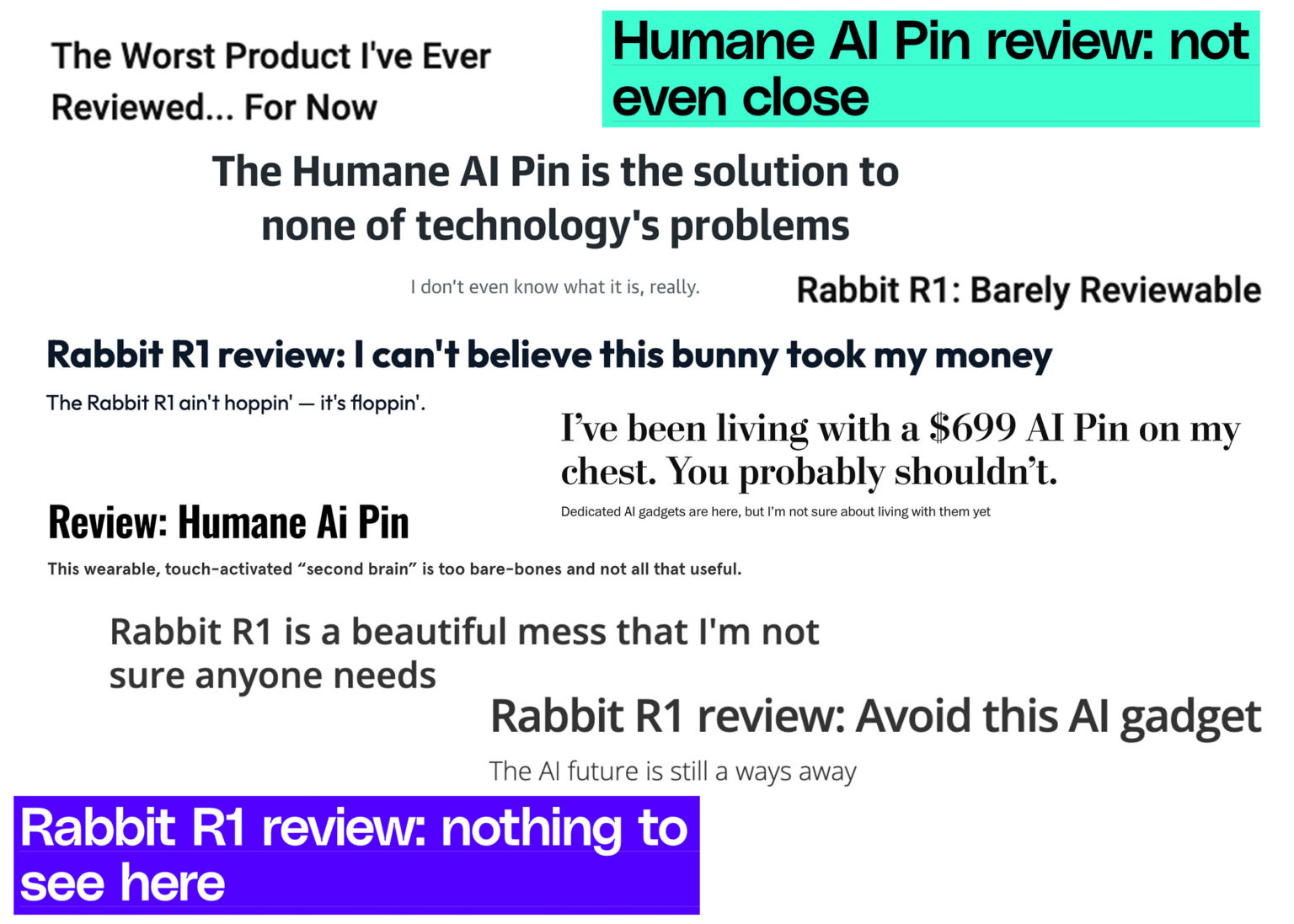
With the long-anticipated release of the Humane AI Pin and the Rabbit R1 the first wave of standalone AI gadgets have arrived in consumer’s hands. And the response has been… overwhelming negative to say the least.
There are more than a few obvious reasons why these AI devices are being thoroughly panned by most reviewers. For starters, they are just plain bad. Both have had their fair shares of flaws right out of the gate: poor battery life, confusing if not completely ineffective interfaces, and perhaps most notable of all barely offering a fraction of the functionality that their companies have been proudly marketing in all the time leading up to these releases. Lately it seems overpromising and underdelivering has become the norm for far too many tech companies, Human and Rabbit Inc. chief among them. Instead of the wide assortment of integrations with third party software and everyday use cases, both companies are now saying that their biggest features are still “in development” or “on the roadmap” while consumers are left with buggy and disappointing bricks that can’t even set a timer or tell you the weather.
What I’ll say about the state of both devices is that consumers can and should demand better from these companies. We’ve seen this same release planning play out in gaming to disastrous effect, and like other reviewers I’ll echo the fact that no one should be paying for these devices in their current state. Both Rabbit and Humane made grandiose claims about what these devices could do and almost none of that capability currently exists in either device. And probably won’t exist for a very long time, if ever. Dangling features like these to entice consumers is at best an underhanded gimmick that creates distrust and also hinders any future attempts to create worthwhile products in this new category. While a vocal minority have stirred controversy by attacking tech reviewers for not giving these companies a chance to iterate and improve their products, those wounds are entirely self-inflicted by making promises that couldn’t be kept.
Many reviewers tried their best to at least acknowledge the few bright spots of both devices. For the Human AI Pin this was the fact that the device was trying something daring by removing your phone from the picture entirely, even if that didn’t really work at all and only further highlighted the effectiveness of the modern smartphone. Meanwhile the Rabbit R1 was mainly applauded for being positioned as more of a novelty device than a serious tool thanks to its cheaper price and sleek Teenage Engineering-supplied aesthetic, not that two hundred dollars is inexpensive (and it still remains to be seen if the device will eventually start charging a subscription). But with very little else to find, most reviewers were forced to fall back on what’s essentially become a trope by now when discussing AI; mentioning the exciting hypothetical potential of gadgets like these in the future, but a future that is very far off from where they are now.
But I think the biggest reason that gadgets like these won’t be adopted anytime soon comes down to a fundamental flaw of current AI technology that has existed since it first exploded in popularity and becomes even more glaring in the context of standalone AI devices: the lack of reliability.
We’ve moved on from the “Hey look at this cool new thing!” era of initial AI discourse and into the “Look at how AI will help regular Joes!” stage. AI companies face rising costs, slowing growth, and massive skepticism need to sell these tools however they can to an increasingly wary public which is also concerned about potentially losing their jobs to these same tools. But the tired answer of “AI can help with xyz but only sometimes and there’s a pretty good chance it will be factually inaccurate or just lie to you fairly frequently” just isn’t good enough for the average consumer. Both the Humane AI Pin and the Rabbit R1 reviews have made it abundantly clear that you shouldn’t rely on them for anything important. Hallucination is rampant, whether you are asking for the weather, the score from last night’s game, or a summary of how nuclear fission works. It’s the same roulette wheel of chance whether or not what you receive from the device is accurate or even addresses your current need.
There’s an implicit trust we have in the devices we use every day and that trust has to be earned. But I still don’t know anyone who puts faith in AI at that level, or even trusts it at all for that matter. If anything this lack of reliability creates a necessity for paranoia that most find uncomfortable if not time-consuming and energy-draining to the point of uselessness. The inherent skepticism we have with AI in its current state makes using them as standalone devices impossible for the same reason why you wouldn’t want to be friends with someone who lied to you every third sentence. A relationship like that means your guard always has to be up to some extent and that is exhausting. You wouldn’t keep a smartphone in your pocket everyday if a call failed every third try, and until that changes no one is likely to keep either the Humane AI Pin or the Rabbit R1 in their pocket (or on their shirt collar) either.
Featured Image Review Links:
- Humane AI Pin
- Rabbit R1